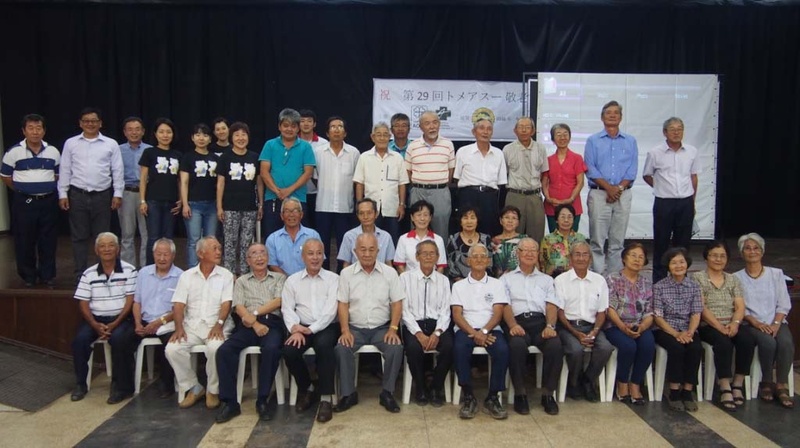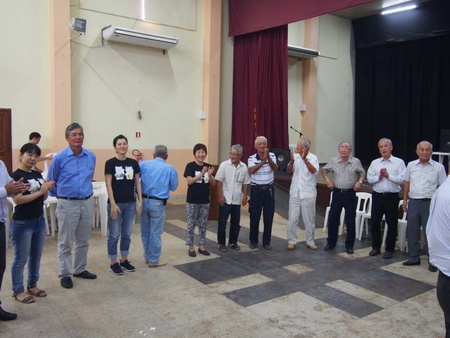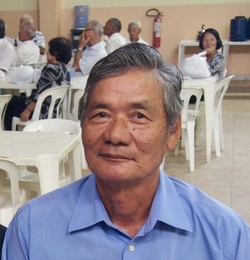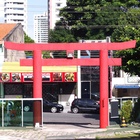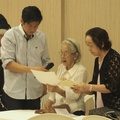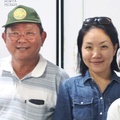The mountains where I chased rabbits, the rivers where I fished for small crucian carp, my dreams still wander through my unforgettable hometown
How are my parents? Are my friends safe? Even in the wind and rain, I remember my hometown.
I will fulfill my ambition and one day return to my hometown, where the mountains are blue and the water is pure.
- Song "Furusato"
The third Tome-Acu Respect for the Aged Day was held in the final year of my term. The Tome-Acu Cultural and Agricultural Promotion Association and the Amazonia Japan-Brazil Support Association took the lead in organizing the event, bringing together many families to pray for the health and longevity of the local elderly, mostly first-generation Japanese. Greetings were given by the head of the Belém Consulate and the chairman of the Promotion Association, and various performances were given, including songs by students from the Japanese language school, choruses by women's groups, and Japanese dance. Homemade lunches from the Tome-Acu Women's Association were also served.
This was my third time attending, and it was the first time I was able to see the event through to its end. At the end, all the participants took a commemorative photo, and then we sang "Furusato," a traditional song every year. We all joined hands and sang in a circle. There was no prior arrangement, but as soon as the music started, everyone naturally formed a circle and took the hand of the person next to them. Before we knew it, we volunteers were part of it. It was a song that we had sung many times since we were young, and we were familiar with it. The words came to us without looking at the lyrics. However, I don't think I have ever felt the meaning of the lyrics as strongly as I did at that moment. What was in front of everyone's eyes as they sang, looking off into the distance? It felt as if each and every word was being spun from there, and it touched my heartstrings.
"Furusato" was written by Takano Tatsuyuki and composed by Okano Teiichi in 1914, and has since been included in the sixth grade textbooks as an elementary school song, and has been sung in many schools across Japan. It is safe to say that anyone who spent their elementary, junior high, and high school years in Japan knows this song. By singing the song and feeling the meaning of the lyrics while superimposing them on the scenery of the place where they were born and raised, the educational purpose seems to be to foster feelings of gratitude towards the parents who raised them and love for their hometown. The town where I grew up is a city with cars and people going back and forth, unlike the idyllic scenery described in the lyrics, but even so, when I hear this song, strangely enough, I still remember that town and my childhood comes to mind.
However, the sight of the people who immigrated from Japan singing at the Respect for the Aged Day event is different from mine. Since immigrating to Brazil, they must have had hardships that are hard to put into words. Some were brought here by their families when they were still toddling, some had to endure hardships living without electricity or running water, some grew up struggling to survive and were unable to go to school, and some had to live in Brazilian society during the war, where anti-Japanese sentiment prevailed. When I think of the feelings of the Issei who have experienced so much, my heart warms.
After the song, I shared my thoughts with Yasuaki Matsuzaki, the Executive Director of Jujiro Amazonia Hospital, who was the MC, and he said with a very gentle expression, "I came here when I was seven years old, so I spent my childhood here. But when I sing 'Furusato', I remember my vague memories of Japan, and it gives me an indescribable feeling. Even though we've lived here longer, Japan is still our hometown to us all." There was a different "Furusato" there from the one I sang about.
When I tell people I'm from Japan, they are kind to me and tell me all kinds of old stories. Maybe it's because they see Japan through me. Although "Japan" is on the other side of the world, I would be happy if they could feel even a little of the "hometown" that is always in their hearts through our conversations. It may be presumptuous, but I thought that helping them do this might also be a role of volunteers.
© 2018 Asako Sakamoto


